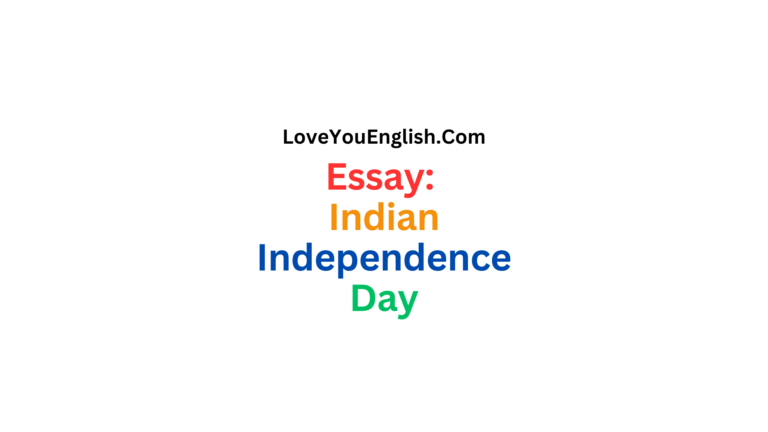Essay About Autobiography: Telling Your Own Life Story
Essay About Autobiography: Telling Your Own Life Story
Essay About Autobiography: Telling Your Own Life Story explains what an autobiography is and how a person can write about their own life experiences. This essay helps students understand the purpose, structure, and importance of autobiographical writing. Written in clear and simple English, it is ideal for school students and English learners. The essay encourages students to reflect on their personal journey, achievements, challenges, and lessons learned. Useful for exams, writing practice, and creative assignments, this topic helps improve self-expression, confidence, and storytelling skills while teaching students how personal experiences shape identity.
An autobiography is a book where someone writes about their own life. It’s like telling your life story to others.
When you write an autobiography, you share your experiences, thoughts, and feelings. It’s a way to look back at your life and share what you’ve learned.
Many people write autobiographies. They might be famous people, like movie stars or politicians. But regular people write them too. Anyone can write about their life if they want to.
Writing an autobiography can be fun and helpful. It lets you think about your past and understand yourself better.
It also lets other people learn about your life and maybe learn from your experiences.
Parts of an Autobiography
When you write an autobiography, you usually include certain things:
Your childhood:
This is where you talk about when you were young. You might write about your family, your first memories, and what it was like growing up.
Your education:
Here, you can write about going to school. You might talk about teachers you liked, subjects you enjoyed, and things you learned.
Your career:
This part is about your job or jobs. You can write about how you chose your career, challenges you faced, and successes you had.
Important events:
These are big things that happened in your life. They could be happy things, like getting married or having children. They could also be hard times, like losing someone you love or facing a big problem.
Your achievements:
This is where you talk about things you’re proud of. It could be awards you won, goals you reached, or ways you helped others.
Your thoughts and feelings:
Throughout your autobiography, you share how you felt about things that happened. You also share what you learned from your experiences.
Why People Write Autobiographies
There are many reasons why someone might write an autobiography:
To share their story:
Some people have lived through interesting or unusual things. They want to tell others about what happened to them.
To help others:
By sharing their experiences, people can give advice or inspire others who might be going through similar things.
To understand themselves better:
Writing about your life can help you see patterns or understand why you made certain choices.
To leave a legacy:
An autobiography is a way to be remembered. It’s something you can leave for your family or for future generations.
To set the record straight:
Sometimes, people write autobiographies to tell their side of a story, especially if there have been rumors or misunderstandings about their life.
For famous people to connect with fans:
Celebrities often write autobiographies so their fans can get to know them better.
How to Write an Autobiography
If you want to write your own autobiography, here are some steps you can follow:
Think about your life:
Before you start writing, spend some time remembering important events and people in your life.
Make a timeline:
Write down the big events in your life in order. This will help you organize your story.
Choose what to include:
You can’t write about everything, so pick the most important or interesting parts of your life to share.
Start writing:
Begin with your earliest memories and work your way to the present. Try to describe things in a way that helps readers feel like they’re there with you.
Be honest:
It’s important to tell the truth in your autobiography. Write about both good and bad times.
Show your feelings:
Don’t just say what happened. Tell how you felt about it and why it was important to you.
Describe people and places:
Help your readers picture the important people and places in your life.
Edit and revise:
After you finish writing, read through your autobiography and make changes to improve it.
More essays:
- Essay about My School for Students and Children
- Essay on Friendship for Students and Children
- Essay on Diwali for Students and Children
- Republic Day Essay in English for students
- Essay on Holi for Students and Children
Different Types of Autobiographies
There are a few different ways to write an autobiography:
Traditional autobiography:
This covers your whole life from birth to the present, usually in time order.
Memoir:
A memoir focuses on a specific time or theme in your life, rather than telling your whole life story.
Personal essay:
This is a shorter piece of writing that tells about a specific event or experience in your life.
Graphic autobiography:
This uses pictures or comics along with words to tell your life story.
Diary or journal:
Some people publish their personal diaries as a form of autobiography.
Famous Autobiographies
Many well-known people have written autobiographies.
Here are a few examples:
“The Diary of a Young Girl” by Anne Frank: This is the diary of a Jewish girl hiding from the Nazis during World War II.
“Long Walk to Freedom” by Nelson Mandela: This book tells about Mandela’s fight against apartheid in South Africa.
“I Know Why the Caged Bird Sings” by Maya Angelou: Angelou writes about her childhood and young adult years in this powerful book.
“The Autobiography of Benjamin Franklin” by Benjamin Franklin: One of America’s founding fathers tells his life story.
“Born a Crime” by Trevor Noah: The comedian writes about growing up in South Africa during and after apartheid.
These books have helped many people learn about different lives and experiences.
Challenges of Writing an Autobiography
Writing about your own life can be hard.
Here are some challenges you might face:
Remembering details:
It can be tough to remember exactly what happened, especially from a long time ago.
Being honest:
It’s not always easy to write about mistakes you’ve made or hard times you’ve gone through.
Deciding what to include:
You have to choose which parts of your life to write about and which to leave out.
Protecting others:
You might worry about how others will feel if you write about them in your book.
Finding your voice:
It can take time to figure out how to write in a way that sounds like you.
Dealing with painful memories:
Writing about difficult experiences can bring up strong emotions.
Benefits of Writing an Autobiography
Even though it can be challenging, writing an autobiography can be very rewarding:
Self-understanding:
You might learn new things about yourself as you write.
Healing:
Writing about hard times can help you deal with them and move forward.
Preserving memories:
Your autobiography will help you remember important parts of your life.
Sharing wisdom:
You can pass on what you’ve learned to others.
Connecting with others:
People who read your story might feel less alone if they’ve had similar experiences.
Leaving a legacy:
Your autobiography will be something your family can keep and read in the future.
Tips for Writing a Good Autobiography
Here are some tips to help you write a good autobiography:
Be yourself:
Write in your own voice, as if you’re talking to a friend.
Use descriptive language:
Help readers see, hear, and feel what you experienced.
Include dialogue:
When you remember conversations, include them to make your story more lively.
Show growth and change:
Talk about how your experiences changed you or what you learned from them.
Be selective:
You don’t have to include every detail of your life. Choose the most important or interesting parts.
Get feedback:
Ask someone you trust to read your autobiography and give you honest feedback.
Revise and edit:
Take time to improve your writing and fix any mistakes.
Autobiography in the Digital Age
Today, there are new ways to share your life story:
Blogs:
Many people write about their lives online in blogs.
Social media:
Platforms like Facebook and Instagram let people share parts of their lives every day.
YouTube:
Some people make videos about their lives and experiences.
Podcasts:
You can record yourself telling your life story for others to listen to.
Digital scrapbooks:
These combine photos, videos, and writing to tell a life story.
These new forms of autobiography let people share their stories with more people and in different ways.
The Impact of Autobiographies
Autobiographies can have a big impact on both the writer and the readers:
For the writer:
Writing an autobiography can help you understand your life better. It can help you see patterns in your choices and behavior. It can also be a way to work through difficult experiences.
For readers:
Reading someone else’s life story can teach you about different experiences and ways of living. It can help you understand other people better. Sometimes, it can inspire you to make changes in your own life.
For society:
Autobiographies can help us understand history and different cultures. They can also bring attention to important issues.
Conclusion
An autobiography is a powerful way to share your life story.
It lets you look back at your experiences, understand yourself better, and share what you’ve learned with others.
Writing an autobiography takes time and effort, but it can be very rewarding.
Whether you’re famous or not, your life story is unique and worth telling.
By sharing your experiences, you can connect with others, preserve your memories, and maybe even help or inspire someone else.
Remember, everyone has a story to tell – including you!






